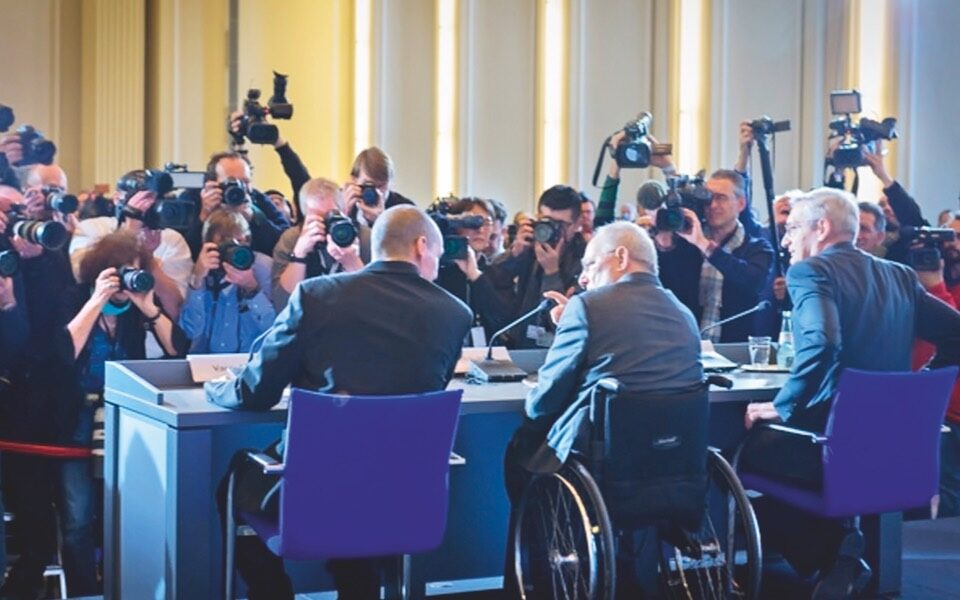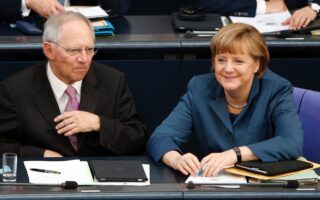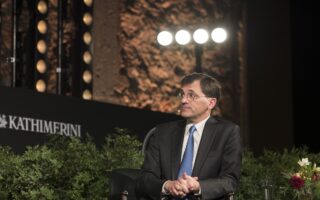Schaeuble always asked after the ‘ordinary Greek’
Former German ambassador reflects on the late Wolfgang Schaeuble’s impact on debt-hit Greece

The former German ambassador to Athens during the challenging period from 2014 to 2017, Dr Peter Schoof reflects on the recent passing of Wolfgang Schaeuble, telling Kathimerini that “no other German politician asked me as regularly about the situation of the ‘ordinary Greek’ as he did.”
Schoof underscores the former German finance minister’s pivotal role in securing approval for the third bailout package for Greece, which necessitated substantial financial contributions from other eurozone countries, contingent on parliamentary approval. This achievement wouldn’t have been possible without the unwavering support of the so-called “czar” of the German and European economies.
As one of the most experienced and effective diplomats representing his country, Schoof, who retired in 2021, is currently serving as a course director at the Center for Political and Diplomatic Studies (CPDS), a UK-based think tank, and holds the position of senior adviser for Berlin Global Advisors, a global geopolitical consultancy. Now sharing his time between Berlin and Athens, Schoof notes that while Greece tends to emphasize Schaeuble’s role in imposing strict austerity during the crisis, Germans perceive his historical legacy as the successful reunification of Germany, a cause he championed as a pioneering figure.
What is Wolfgang Schaeuble’s legacy regarding the Greek crisis?
Before answering the question allow me to remind readers in Greece that Wolfgang Schaeuble’s extraordinary influence in Germany stems from the fact that he was the mastermind behind the unification of Germany in 1990. It was Wolfgang Schaeuble who, as minister of home affairs, conducted the negotiations on the Accession Treaty through which the former GDR acceded to the Grundgesetz – i.e. the constitution of the Federal Republic of Germany. Although international obituaries put an emphasis on his role as German finance minister between 2009 and 2017, the successful completion of Germany’s unification was his masterpiece and represents, at least for us in Germany, his most outstanding historical legacy. It was also the source of his extraordinary influence on German politics.
As for Greece, his legacy is twofold: Firstly, he took it upon himself to lead and represent a sizable group of member-states who believed that the fiscal rules of the eurozone were sacrosanct and that the cohesion of the eurozone required discipline for the sake of the global credibility of our common currency, even if that came at the price of harsh austerity. He accepted this role, as finance minister of the eurozone’s biggest economy and as protagonist of this school of thought, in the showdown which we all witnessed in 2015. This made him the target of intense controversy, harsh personal criticism and also, in the case of Greece, populist hostilities.
Secondly and more importantly, he was instrumental in securing agreement in the Bundestag on the agreement reached on July 12, 2015 in the European Council, although it was known that he had favored a temporary suspension of Greece’s membership in the eurozone. Don’t forget that the third package of assistance required important budgetary contributions from other eurozone countries which had to pass parliamentary process. Without Wolfgang Schaeuble’s loyalty to Chancellor [Angela] Merkel and his overwhelming authority in the Bundestag, I have my doubts whether the Bundestag would ever have ratified this package. This important contribution is easily overlooked by many, both in Greece but also in Germany.
With this in mind, he greatly contributed to the consolidation of Greece’s economic recovery.
In your dealings with him, did you have a sense that he was feeling the pain Greek people suffered?
My clear memory from my several personal encounters with him was that this was in fact his first question and concern. I remember conversations that started with him asking me, “How are the Greeks coping with this incredible hardship they are required to go through?” Contrary to the picture often drawn, Wolfgang Schaeuble was a very human and empathetic person. He had grown up with the hardships of post-war Germany. Believe me, his childhood had probably been a lot more austere than that of some of his Greek interlocutors and he knew what modesty and restriction meant for normal families. He spent no efforts back in Germany to mobilize accompanying funding for structural reforms – e.g. through KfW [the German Development Bank] – and strongly supported assistance from EU funds for structural reforms.
Did he ever ask how Greeks felt about him?
In my perception, Wolfgang Schaeuble was a reserved and modest human being. He was not flamboyant and his sense of vanity, contrary to some of his interlocutors, was well-hidden. In interviews he would say that if you enter politics you have to be tough and stand the heat. He was a man of values and convictions. He was aware of his public image in Greece. It didn’t need the daily press reports of the embassy, there was overwhelming media coverage in Germany on the Greek sovereign debt crisis. So even if he didn’t put this question to me explicitly, you can be sure that he knew about the controversy around him here in Greece. And I would like to repeat: No other German politician asked me as regularly about the situation of the “ordinary Greek” as he did.
Was the threat of Grexit real on his part?
Again, it is difficult to read his mind, even in retrospect. In my view, his position on a possible Grexit evolved over time. My interpretation was that he was critical as to whether the SYRIZA government was committed and, above all, able to secure political agreement in Greece for the austerity and adjustment that was required from Greece. Wolfgang Schaeuble was a very rational politician. As the terms of the eurozone were non-negotiable (an impression challenged at the time by his Greek counterpart), the culminating event was the referendum on July 5, 2015, which in his eyes was proof of his reading of Greek politics. It was his belief that in this situation it was better for the Greek people to have eurozone membership suspended and adjust through a temporary return to the drachma with a perspective to returning to the eurozone under better conditions. Let me remind you that there was an important momentum for this line in the Eurogroup – i.e. among eurozone finance ministers. Ironically, there was at least a partial convergence with the line taken by his then Greek counterpart.
I think that he was aware of the fact that the chancellor did not share this line. As Schaeuble, she held on to the values and principles of the eurozone. But for her, the global risks, not least a domino effect threatening the common currency at large, outweighed the discomfort of holding on to Greece. In the German domestic context, with a parliament more opposed than in line, this meant taking considerable risks. Had it not been for Schaeuble’s loyalty to Merkel, the risk of a Grexit would have become very real indeed.
Did he make your life difficult as ambassador?
My life as ambassador at the time was a challenge, yes. But not because of Wolfgang Schaeuble. It was a time when both countries were entangled in a political crisis which was highly emotional. Allow me here to say that the role of the media, in both countries, was not always helpful, to put it mildly. I have often said that it was sometimes as difficult to have a rational discussion about Germany in Greece as it was to have a rational discussion on Greece in Germany. What counted for me was to translate some of the language and posturing from both sides into the real messages and codes that were behind them – in both directions. Here in Greece, the challenge was also to explain to my Greek audience that Germany was not a monolithic bloc obsessed by excessive austerity, but that discussions on how to handle the sovereign debt crisis were as intense and controversial in my country as they were here. Don’t forget that we had a coalition government with the Social Democrats, who disagreed with many aspects of our own crisis management. And as for Wolfgang Schaeuble, his role and authority in Germany and Europe opened many doors and discussions through which I was given the chance to listen to decision makers, but also to many people from various walks of life here, to explain the rationale and background of Germany’s position at the time and, not least, to report back on Greek sentiments and positions. So, in his way, his role in Germany and Europe even facilitated my job at the time.





